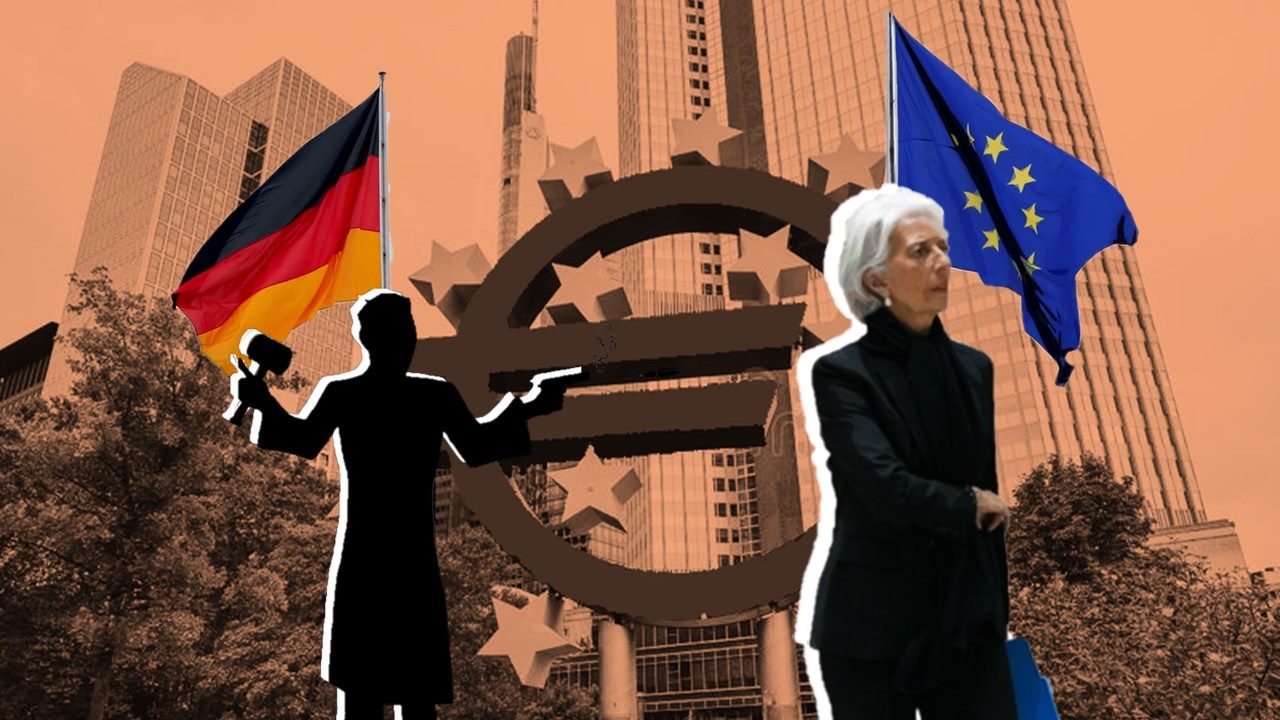In a ruling of May 5, 2020, the German Supreme Court has asked the European central bank to justify in a “comprehensive and detailed” way the sovereign debts purchase program it started in 2015. With a single ruling of about 20 pages, the German judges are both carrying out a putsch in the European legal system and undermining the integrity of the euro area as well as the rule of law in Europe.
The origins of the problem
Let’s go back in time. In July 2012, in the midst of Europe’s sovereign debt crisis, Mario Draghi stood up as the savior of the single currency by declaring that the ECB would support the euro “whatever it takes“. By saying that, he showed to all economic players that the ECB would not hesitate to come to the rescue of Italy or Greece, both in difficult situations. This saved the eurozone from an impending monetary and financial collapse.
The usefulness of eloquence: these two sentences saved the euro from collapse in June 2012.
But fiscal policy did not follow suit. Although national governments traditionally have two tools to deal with conjunctural shocks – fiscal policy and monetary policy -, Northern Europe refused any fiscal stimulus at European level because of moral hazard : they did not want to pay for the “Club Med”, this undisciplined and spendthrift Southern Europe, guilty of all budget excesses. Therefore, in the absence of coordinated massive investments, Europe plunged into the crisis. Taking note of this deadlock, the ECB understood that only monetary policy could now be set up to fight against the crisis. After the “whatever it takes” of 2012, it started in 2015 a program to buy European public debts, a program called PSPP (for Public Sector Purchase Program), or in economic jargon, Quantitative easing (QE). Officially, the aim was to reduce spreads to ensure the integrity of the eurozone (EZ). The behind-the-scenes goal was quite different : to support long-term economic recovery in Europe by lowering member states’ interest rates so that they could invest. Many in the continent applauded this decision, happy that an institution was finally taking up its responsibilities with such inventiveness.
Central bankers needed inventiveness, it goes without saying. How could they justify a program of public debt purchases when the monetization of public deficits is explicitly prohibited in the chart of the Central Bank ? First, the ECB decided to intervene only in the secondary bond market (where government bonds are traded) rather than in the primary market (where the government finances itself directly), thereby only funding member states indirectly. This is different from the FED and Bank of England who regularly intervene in the primary market. Second, the ECB decided to establish its own limits to its action : for example it cannot hold more than 33% of the sovereign debts of a single Member-State (otherwise the ECB would be accused of public financing, as 33% is the threshold above which the creditor has a right of veto on the debt held). Between 2015 and 2020, the ECB bought around 2,6 trillion-euro sovereign bond securities, strengthening the economic recovery and relieving struggling member states, such as France and Italy.
This sleight of hand did not please everyone. In Germany, these new ECB rules were received with indignation and hostility. Indignation first, because many Germans (including economists and politicians) saw in this program a violation of the ECB chart and the rules established in Maastricht, according to which the ECB should only be concerned with price stability. Hostility then, because this expansionary monetary policy struck German savers interests, a share of the population which is ubiquitous in the collective imagination of this country.
Needless to say, these criticisms are not deprived of irony. First, because it was Germany which, back in 1992, made the independence of the Central Bank a sine qua non condition for the establishment of the euro. They believed that an independent ECB would perfectly execute the ordoliberal principles that are to be found in the Treaties. But times have changed, and this same independence became the main asset of Draghi who could now afford to say, “whatever it takes, despite Germany“. Germany did not give up: through the President of the Bundesbank, Jens Weidmann, Berlin launched an ideological guerrilla war to oppose the ambitious ECB monetary policy. Without any success, especially in 2018 when the candidacy of Christine Lagarde for Frankfurt was preferred to that of Weidmann.
“When savings make you poor : zero interest rates are destroying the Germans’ wealth.” This is how the ECB’s action are seen in Germany, the country of savers.
This ideological guerrilla warfare became a legal war with the ruling of May 5, 2020 of the German Constitutional Court, also called BVerfG (for Bundesverfassungsgericht in German).
The war breaks out
Ruling on the legality of the PSPP, the ECB’s public debt purchase program, the Court of Karlsruhe decided that the ECB had three months to justify the proportionality of the program with regard to its economic consequences, otherwise the Bundesbank will stop participating in the QE policy. To reach such a conclusion, the BVerfG adopted monetarist arguments : officially it accuses the ECB of having encroached on fiscal policy, which is a prerogative of the Member States, by having reduced the rates for public funding. German judges added that the PSPP allowed “zombie” companies to stay alive and hurt the savers…
Can you imagine economists explaining to attorneys how laws work ? The arguments the German court used are all the more dubious that :
– Monetary policy always has consequences on fiscal policy and for savers (by definition, it influences the interest rate and therefore the incentive to save…)
– The Court is demanding a “proportionality” report of the PSPP policy, even when the ECB has itself conducted hundreds of studies in this regard, which can be found on its website. The German newspaper Der Spiegel mocked the Court the very same day: “Do they have access to the Internet at the Constitutional Court ? “
By acting as they did, it is indeed a missile that the German judges have sent to the European Union, since the European Court of Justice (ECJ), on which all national courts theoretically depend on, had already ruled in December 2018 on the legality of the QE program… Karlsruhe’s response ? The ECJ decision is “incomprehensible” and “did not sufficiently measure the economic consequences of the PSPP“. This slap of the ECJ is truly a putsch against the European legal system established since 1964 (Costa v. ENEL) which already has unexpected consequences. As of May 6, the Polish Law and Justice government has already welcomed the judges’ decision. After all, the far-right party is seeking to strengthen its authoritarian power, but so far, the ECJ had always opposed it … This ruling might prove them right.
The ECJ had been at the forefront to defend the unity of EU law, in particular regarding the rule of law in Poland and Hungary. The Polish government was the first to welcome Karlsruhe’s decision.
Even more serious in such a time of economic crisis, this ruling puts the credibility the ECB has enjoyed with the financial markets the past decade at risk… By declaring that the ECB could not “do everything” to defend the euro zone, the BVerfG threatens the very effectiveness of its monetary policy. After this, what will markets think of the euro currency, knowing that a sword of Damocles hangs over the institution supposed to protect it ? The ECB has realized the danger of such an outcome : acceding to the demands of the German judges would be tantamount to accepting the end of its independence, as well as the very end of the ECJ. The ECB board published very quickly a laconic communiqué recalling the supremacy of the ECJ and the legality of the PSPP program according to the latter. In short, “It’s nice to worry, but this is our problem“.
What will the German court do in 3 months, if the ECB maintains its position? To ban the Bundesbank from participating in ECB programs would be to deprive Europe’s monetary policy of its main strike force. It was the German bonds, considered safe by markets, which made the action of the Central Bank credible. Such a situation would be catastrophic for the future of the euro and the euro zone, which would no longer have any countercyclical tool in the event of an economic crisis. However, it remains unlikely that the BVerfG will carry out its threats : what it seeks above all is to internalize the monetarist doctrine at the ECB in the long run, by saying to them “it’s ok for this time, but watch out for the future“. With this putsch, the Germans are certainly positioning themselves over the long term, so as to create a deterrent against lax monetary policy.
If the last non-monetarist stronghold in Europe fell, it would be killing the only institution that was able to maintain the integrity of the EZ, the only one that took responsibility when everyone looked elsewhere.
Ordoliberalism at the origin of the European tragedy
If for the past ten years Europe has been plunged into a slump, it is precisely because of the failing economic policies that the conservative “hawks” have imposed at the European Council. Since the Maastricht Treaty, the Convergence and Stability Treaty has established a number of criteria in the eurozone, for example the prohibition of public debt above 60%, deficits above 3% and since 2013 structural deficits above 0.5%. These bans would not be problematic if the eurozone had a federal fiscal policy or social transfers, acting as countercyclical cushions.
Yet the countries of Northern Europe, like the Netherlands or Finland, do not want to hear about it. As a result, Europe has no fiscal nor structural policy, and its monetary policy, however ambitious it may be, cannot adapt perfectly to the different economic conditions of its 19 Member States. Accordingly, how can we be surprised of the dropout of Europe since 2010? The GDP per capita of the European Union has not grown at all, when that of the United States increased by 30% and that of China by 75%. Because of this deadlock, where Europeans refuse both structural policies, because they are too expensive, national investments, because the Member States are already in enough debt, and coordination of European policies, because it would be crazy for the virtuous to pay for the undisciplined, Europe is on the brink of economic chasm. Economists call this chasm “secular stagnation”. The term has been in fashion since 2013, when US economist Larry Summers warned Western countries of the danger Japan has been fighting since its 1990 banking crisis.
Secular stagnation is a situation in which economic growth stagnates in the long run due to the lack of investment in productive and human capital ; this sluggish growth further reduces the economic and financial room for maneuver, which again reduces the country investment capacity, etc… In this trap, monetary policy is useless because the funds it releases will end up in the financial sphere for lack of confidence in the future (a bank that does not trust in the future will prefer to purchase financial assets rather than invest in the real economy). This situation is even more serious given that the characteristics of the Old Continent favor this economic slump : old and aging population, structural and high unemployment, State and household indebtedness, technological backwardness… In short, Europe is going straight into the wall.
This is where the German court’s decision to denounce the ECB’s monetary policy may ultimately save the eurozone… If this battle ends in a stalemate, a treaty change will be needed to clarify competences. The definition of what Europe is, be it a transnational sui generis entity or a simple association of sovereign states, will be debated in such case. But more importantly, a redefinition of economic policies will certainly be discussed too. Indeed, as economist Frederik Ducrozet said to French newspaper Le Monde, “The Germans are schizophrenic on the euro. One cannot at the same time want to be in the euro, refuse to pool debts and be against the intervention of the ECB.” And since May 5 this has become obvious to everyone. Germany will therefore have to choose: to refuse any form of bond mutualization is to accept an aggressive monetary policy which makes spreads sustainable ; to refuse an aggressive monetary policy which swells financial assets and impoverishes savers is to recognize the interest of a European fiscal policy to get out of this slump …
The real difficulty is that the fate of Europeans has never been as closely linked as it is today. Economic integration has reached such a depth that the problems of some are the problems of everyone. Yet secular stagnation no longer threatens Europe, it is already here. Or as the French economist Michel Aglietta says: “Governments have discarded monetary policy for too long“. Although the ECB’s current monetary policy is likely to fuel speculative bubbles, it is at the moment the only reason for having hope.
It cannot be denied that the crusade of the German Constitutional Court against the ECB’s independence has the appearance of collective suicide, and much more of murder with Machiavellian allures on the part of fanatics who do not understand anything of today’s complex economy.
For further readings :
An analysis from the Financial Times explaining why a sustained demand policy is also in the interest of savers :
https://www.ft.com/content/2c5ddbd0-8e09-11ea-9e12-0d4655dbd44f
The account of the January 21-22, 2015 meeting of the Governing Council of the ECB justifying the debt buyback program (and which the German judges did not bother to read) :
https://www.ecb.europa.eu/press/accounts/2015/html/mg150219.en.html










